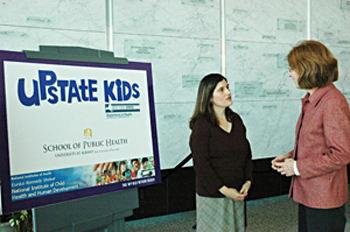Druschel's Passion: Preventing Birth Defects
 |
Dr. Charlotte Druschel, far right, is also principal investigator on the Upstate New York Infant Development Screening program. (Photo Gina Muscato) |
Charlotte Druschel, M.D., has spent a lifetime monitoring the causes of birth defects and training the next generation of birth defects researchers.
Druschel, a faculty member at UAlbany's School of Public Health (SPH) for 19 years while working at the New York State Department of Health, has served an important role in mentoring young scientists as they develop careers in maternal and child health epidemiology, and health defects research.
"She always demonstrates her strong passion for understanding the causes of birth defects, and working to improve the health of infants and children," said SPH Associate Dean Mary Applegate.
Birth defects are more common than most people know, with about five percent of infants having a major birth defect. They are also a leading cause of death in infants and remain among the top 10 causes of death through young adulthood, according to Druschel.
"This is an exciting time to be working in the field. We do not know what causes at least 70 percent of birth defects, but we are starting to uncover some ways that women can reduce risk, taking folic acid before pregnancy, for example, and research is ongoing looking for more risk factors," said Druschel, assistant professor of Epidemiology and Biostatistics.
Druschel is a reproductive and perinatal epidemiologist who played a key leadership role in the formation of the National Birth Defects Prevention Network, which recently presented her with the prestigious Godfrey P. Oakley, Jr. Award. The award recognizes Druschel's lifetime contributions to birth defects research.
As a principal investigator in the National Birth Defects Prevention Study, Druschel has played a major role in assessing environmental and occupational exposures as causes of birth defects.
She has developed methods of monitoring fetal alcohol syndrome, and implemented this strategy in New York State. Fetal alcohol syndrome can result in structural birth defects and developmental disabilities, and is a key area for prevention.
Currently, Druschel is principal investigator on four major projects funded by the Centers for Disease Control:
� Neural tube defect surveillance in the Lower Hudson Valley
� The Center of Excellence for Birth Defects Prevention Research
� Surveillance and Epidemiology of Duchenne and Becker Muscular Dystrophy, and
� The follow-up of Children with Craniofacial Malformations.
In addition, she is principal investigator for a research contract with the National Institute of Child Health and Human Development to identify genetic risk factors for major birth defects.
![]() For more news, subscribe to UAlbany's RSS headline feeds
For more news, subscribe to UAlbany's RSS headline feeds


